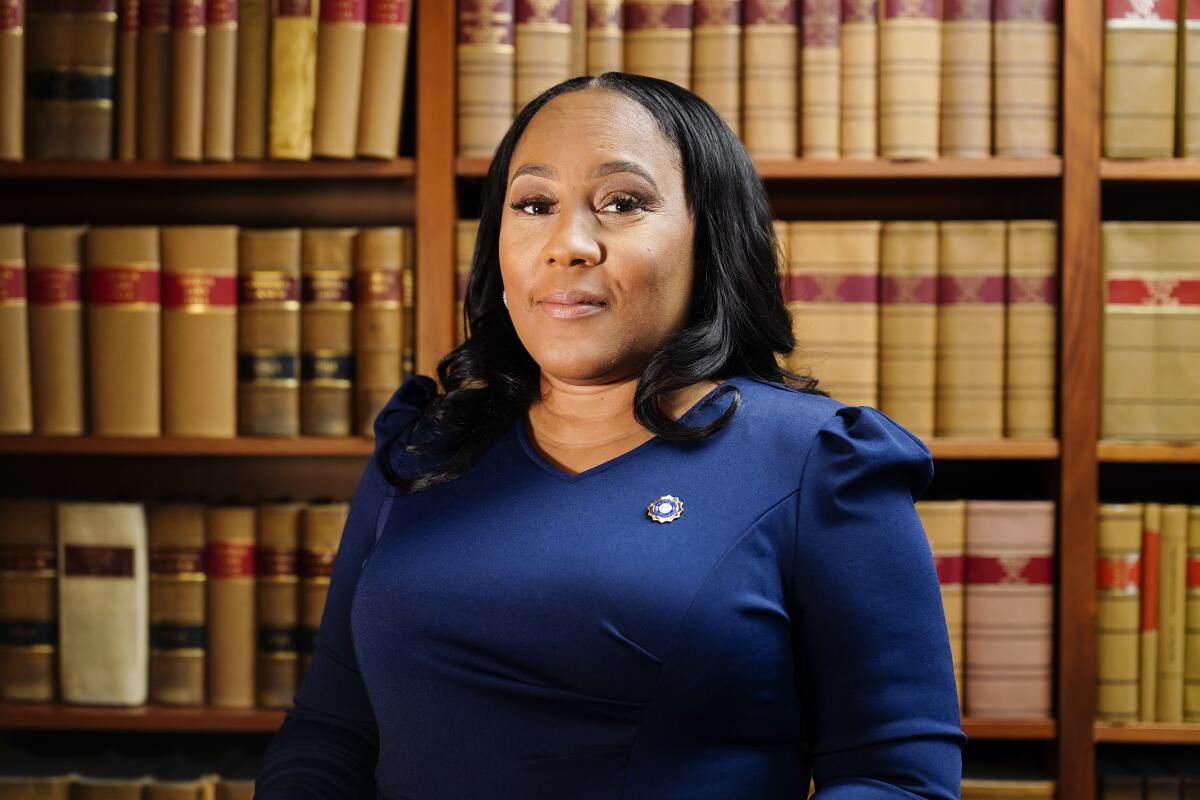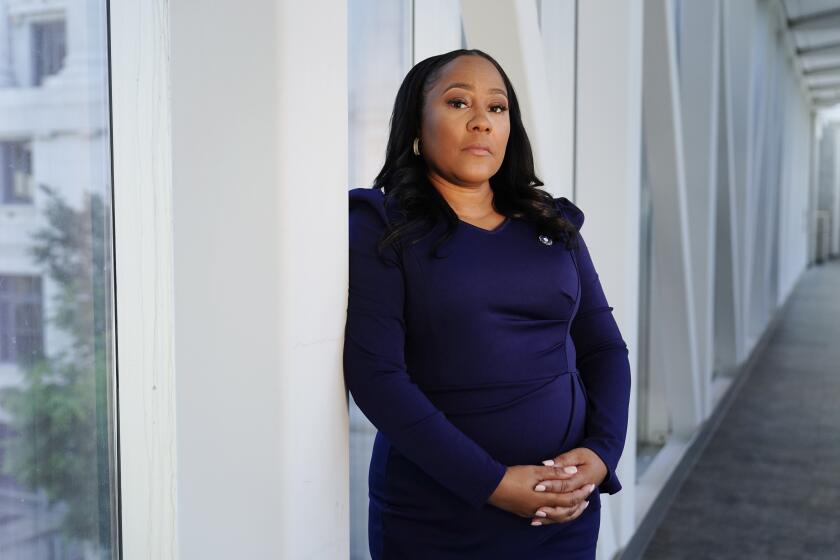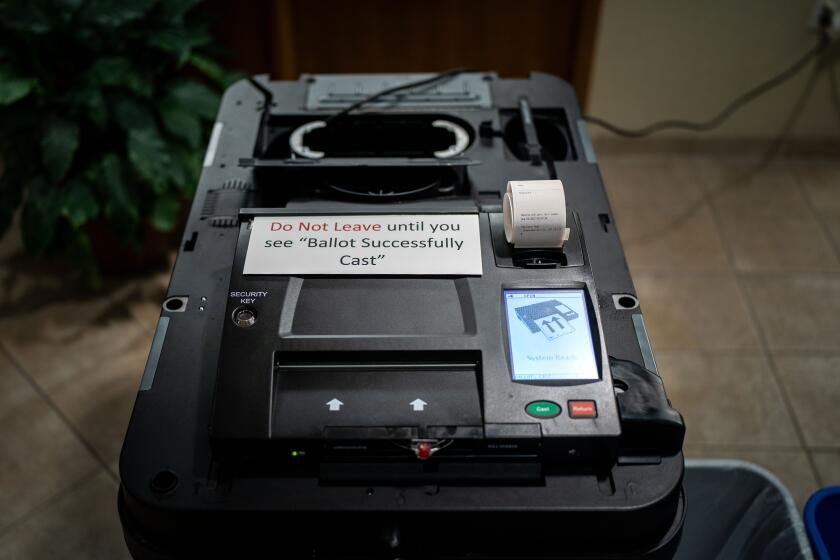At least 8 fake Trump electors have immunity in Georgia election investigation

- Share via
ATLANTA — The prosecutor investigating possible illegal meddling in the 2020 election in Georgia has agreed to immunity deals with at least eight fake electors who signed a certificate falsely stating that then-President Trump had won the state.
Kimberly Debrow, the supposed Republican electors’ defense lawyer, revealed the existence of the immunity deals in a court filing Friday, saying her eight clients had accepted the agreements last month. The filing does not identify those who were offered immunity.
Last July, Fulton County Dist. Atty. Fani Willis’ office revealed that the 16 people who signed the false elector certificate were all targets of her investigation, which is examining whether Trump and his allies committed any crimes while trying to overturn his narrow election loss in Georgia.
The 16 fake electors met at the state Capitol on Dec. 14, 2020, and signed a certificate that declared falsely that Trump had won the presidential election and that they were the state’s “duly elected and qualified” electors.
The news of the immunity deals signals that Willis is continuing to work on the case as she prepares to decide whether to seek charges this summer. In letters sent late last month, she advised law enforcement agencies to prepare adequate security for her announcement of her charging decisions, which she intends to make between mid-July and early September.
The prosecutor who is investigating whether then-President Trump and his allies illegally meddled in the 2020 election in Georgia says she expects to announce charging decisions this summer and is urging ‘heightened security.’
Debrow’s filing Friday came in response to a motion Willis filed last month seeking to bar the defense lawyer from further participation in proceedings stemming from the investigation.
When Willis informed the 16 fake electors last summer that they could face charges from the investigation, 11 of them were represented by Debrow and another attorney, Holly Pierson, who were both hired by the state Republican Party.
Fulton County Superior Judge Robert McBurney, who oversaw the special grand jury that had been seated to aid the investigation, ruled in November that Georgia Republican Party Chairman David Shafer could not share an attorney with the other 10 fake electors represented by Debrow and Pierson. As a result, Pierson continued to represent Shafer and Debrow represented the other 10.
Debrow said in the Friday filing that when the district attorney’s office offered immunity deals to eight of her 10 clients, she consulted with her other two clients and it was determined that the “most conservative and practical course” was for those two to hire their own lawyers. She said they have since done that.
In her motion last month, Willis said some of Debrow’s clients had told the district attorney’s team in April that one of the fake electors Debrow represents “committed acts that are violations of Georgia law.”
Willis’ motion adds that some of Debrow’s clients said they were never told about possible immunity deals last summer despite Pierson having told the court that she and Debrow had spoken with their clients and that none were interested in a deal.
Federal law enforcement doesn’t appear to be investigating the former president’s allies’ attempts, some successful, to access election machines. Experts are alarmed.
Willis wrote that Debrow’s representation of 10 of the fake electors represented a clear conflict and had become an “impracticable and ethical mess.”
Debrow called Willis’ motion “reckless, frivolous, offensive, and completely without merit.”
The only actual immunity offers made by Willis’ team came on April 4, and any prior discussions were “highly generalized, non-individualized ‘offers to offer’ potential immunity to undisclosed recipients,” the defense attorney wrote.
The 11 people she and Pierson represented last summer were each provided with information in August on the existence and possible implications of potential immunity offers, and all 11 declined potential immunity as presented at the time, Debrow said.
During the interviews with her clients last month, prosecutors never said they believed that any of Debrow’s clients was incriminating another and never said they objected to her representation of all of her clients, Debrow wrote.
Meanwhile, Trump’s Georgia legal team filed a motion in March seeking to toss the special grand jury report and any evidence related to its investigation, and to bar Willis from any further involvement in the case.
Cathy Latham, one of the Republican Trump supporters who signed the bogus elector certificate, joined the Trump team’s motion on April 29. Latham was previously one of the 10 represented by Debrow, but her filing last week to join the March motion was made by a different lawyer.
McBurney has given Willis until May 15 to file a combined response to the Trump and Latham motions.
More to Read
Get the L.A. Times Politics newsletter
Deeply reported insights into legislation, politics and policy from Sacramento, Washington and beyond. In your inbox twice per week.
You may occasionally receive promotional content from the Los Angeles Times.












